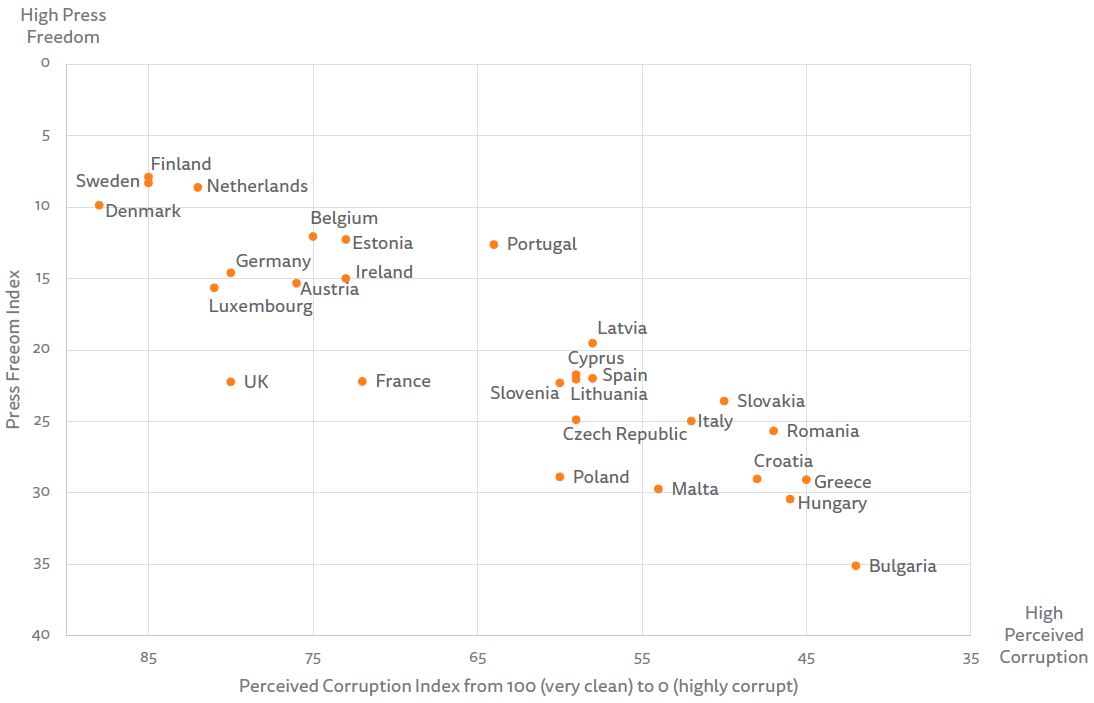
For European media to thrive in an increasingly confusing environment, it needs three things: freedom, funding, and help finding a future. In that order.
That’s the argument of a new report out today from the Reuters Institute for the Study of Journalism and addressed to the European Commission. (A new Commission president, Ursula von der Leyen, will take office next week, replacing Jean-Claude Juncker.)
“We find ourselves at a critical juncture, where digital media policy has not kept pace with digital media reality. Yesterday’s broadcast and print media policies are not always fit for purpose in an increasingly digital, mobile, and platform-dominated media environment,” the report says.
The European Commission is the executive branch of the EU and is responsible for proposing and executing legislation across the union. The report notes that while concerns about press freedom and disinformation haven’t reached the same dangerous levels in Europe as they have in other parts of the world, the degree of danger varies across member countries; countries with a high perception of government corruption typically enjoy less press freedom.

Here’s how the report sums up those three F’s:
Without freedom, no amount of funding or investment in the future will ensure independent professional journalism. Given the established threats to free expression and media freedom in some European Union member states, it is clear that these issues have to be addressed first in these countries before any other measures can find long-term success. Of the options we review in the report, addressing the implementation gap between what elected officials have committed to on paper and what governments do in practice, especially around protecting free expression, media freedom, the protection of journalists, and genuine independence for public service media and media regulators, will be the first step. The second step could be to link access to EU funds to performance in an annual rule of law review that includes a focus on free expression and media freedom.
Without funding, independent professional journalism will wither away. Given the rapid decline of legacy businesses, this funding will have to come from a combination of a new, digital, business of news and various forms of public support, including for independent public-service media and non-profit media. Although private-sector news media have represented the majority of investment in journalism in the past, in most cases will continue to do so in the future, and are essential for providing a diverse range of outlets, the risk of market failure, especially among some local and niche audiences, is significant. Of the options we have reviewed, the three most promising policy responses are: (a) the reform and potential expansion of existing forms of support for private-sector media so they better support the digital future of journalism, and not just its offline past; (b) a recognition of the role that genuinely independent, adequately funded, public-service media operating across all platforms can have (provided they have a clear role and remit, and avoid crowding out private competitors); and (c) rapid reform to ease the creation and funding of non-profit news media.
Without a future for independent professional journalism, we risk leaving European democracy worse than we inherited it. Forging that future is primarily a task for the profession and the industry itself, a task premised on developing forms of journalism, media formats, and products that people find genuinely compelling and valuable. We have already begun to see some impressive and creative efforts, even as the pressures both reporters and news media businesses face are intense. But policymakers can play a role as well. Of the options we have reviewed, three stand out: (a) making sure that all active in the digital marketplace compete on a level playing field; (b) providing public funding for innovation in journalism and news media to help with the transition; and (c) securing a more accountable, intelligible, and transparent platform-mediated environment through the promotion of multi-stakeholder oversight mechanisms, media literacy projects, and data access for independent research.
The report’s authors, Rasmus Kleis Nielsen, Robert Gorwa, and Madeleine de Cock Buning, note that one of their main concerns is that there hasn’t been an independent analysis of the disinformation problem — and that without that, it’ll be even more difficult to make any impactful change.
“There simply is no comparable research in any European country that we are aware of, and the near-total absence of independent evidence means evidence-based policy-making is almost impossible, as policymakers will have to rely on testimony from private companies or advocacy groups,” the report says. “In the long run, it is unsustainable for public authorities and private companies to be allowed to mark their own homework in such an important area with no independent oversight.”
Some of the policy suggestions to the commission include:
Without a future for independent professional journalism, we risk leaving European democracy worse than we inherited it.
Forging that future is primarily a task for the profession and the industry itself, a task premised on developing forms of journalism and media formats and products that people find genuinely compelling and valuable. We have already begun to see some impressive and creative efforts, even as the pressures both reporters and news media businesses face are intense. (European journalists have developed many innovative formats for digital journalism in recent years and digital revenues in the European newspaper industry have grown on average 10% year-on-year from 2015 to 2019, even as print revenues declined.)
But policymakers can play a role as well. Of the options we have reviewed, three stand out: (a) making sure that all active in the digital marketplace compete on a level playing field; (b) providing public funding for innovation in journalism and news media to help with the transition; and (c) securing a more accountable, intelligible, and transparent platform-mediated environment through the promotion of multi-stakeholder oversight mechanisms, media literacy projects, and data access for academic research.
Find the full report here.